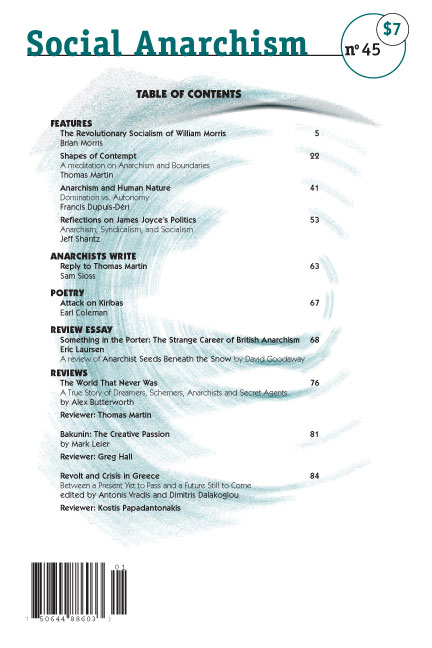Reply to Thomas Martin
I was pleased to see Thomas Martin’s two articles on anarchism and human nature. I agree with many of his points and I’m delighted to see Social Anarchism taking evolutionary theory seriously. But I think Martin could have chosen better role models.
Martin is correct that it is time to retire the “blank-slate” model of human behavior. Likewise the nature-nurture debate is overly simplistic and not helpful. And Martin does a nice job of debunking problematic hypotheses like the “rape scenario.”
Unfortunately, Martin’s chose to focus on the works of evolutionary biologists like Dawkins and cognitive psychologists like Pinker and Tooby and Cosmides. These scientists are not unimportant. They have done much to promote evolutionary thought, but their focus is on individual mental states or in the case of Dawkins (The Self Gene), individual genes. Their work does little to enlighten us about building community.
The result is that Martin ends each essay with empirically false conclusions. In the first he writes, “As for morality: this is learned behavior. The fact that we do not agree on what is ‘moral’ proves that morality is not hard-wired.” As I show below, morality is hard-wired. The “Golden Rule” predates civilization, religion, and even human beings.
Martin concludes his second essay flirting with post modernism and the mind-body dualism. He tosses out the exotic, if not eccentric, speculation that the universe itself is conscious. Then he suggests Eastern religions like Taoism and Buddhism, or even shamanism might help science answer questions about the evolution of brains. How answering this question might help us build community and a more just society is never explained.
In the final paragraph of his second essay, we get a generic summary that human nature is somewhat hard-wired and somewhat malleable. Just how nature and nurture interact is never described in any detail. That Martin does not have a firm grasp of this interaction is reflected in his claim that, “sociology is a branch of psychology, and psychology is in turn a branch of biology.” He follows his notion of disciplinary hierarchy by asking, “how can we hope to understand social relationships if we do not understand the nature of beings who conduct those relationships?”
What Martin and many evolutionary psychologists (or psychologists of any stripe) do not understand is that “social” is not a brain app. Life is social. Even one-celled organisms form colonies when environmental conditions call for it. Complex human brains are not required for cooperative behavior. Sexual species, even those with microscopic brains, have evolved social signals to identify a conspecific and to recognize mating rituals.
Birds and mammals are born so prematurely they evolved social behaviors and skills we refer to as family. Families are moral units. Haves share with the have nots; the able help those less able. We don’t learn family moral values like we learn the States and Capitols, this moral behavior is part of our evolutionary history.
These behaviors are not limited to family. Apes adopted and care for unrelated orphans. Jane Goodall cites an instance where two males cared for an orphan who would have died otherwise. Primates keep track of favors and act reciprocally. Sharing food with non-family members is common. In 1996, a young boy fell into the gorilla enclosure at the Brooklyn Zoo in Chicago. A female gorilla named Binti carried the unconscious boy up to the door where humans could get him. While many were surprised, primatologists were not. That is what gorillas do.
If I were to recommend one evolutionary scientist to read, it would be Frans de Waal, a Dutch primatologist and ethologist who lived the first half of his life in the Netherlands and the most recent 30 years in the U.S. De Waal reads anarchists like Peter Kropotkin. De Waal is also the planet’s leading expert on selfish, aggressive, and cooperative behavior in our nearest relatives - monkeys, chimpanzees, and bonobos.
In addition to his many papers, some of his books include: Chimpanzee Politics (1982), Peacemaking Among Primates (1989), Good Natured: The Origins of Right and Wrong in Humans and Other Animals (1996), Chimpanzee Politics: Power and Sex among Apes (2000), Our Inner Ape (2005), and his most recent, The Age of Empathy: Nature's Lessons for a Kinder Society (2009). As you can see by the titles, de Waal’s focus is on the social relationships that bind primates together. The research he reviews includes all primates, including homo sapiens sapiens.
If you read de Waal, you will learn that while primates can be aggressive, they also have reconciliation strategies and behaviors. Aggressive behaviors can be mediated by environmental factors, including role models. When two year old rhesus monkeys, an aggressive species, were placed for months with a group of rather peaceful stump-tailed monkeys, the rhesus monkeys were less aggressive as adults.
Where male chimpanzees regularly abuse females, male bonobos, who are equally close to us genetically, never abuse their females. Living on the south side of the Zaire river, bonobos have no gorillas to compete for food. More food allows female bonobos to forage in groups where chimpanzee females forage in isolation with only their offspring. This togetherness allows female bonobos to form closer bonds. Should a male bonobo behave like a chimpanzee, females quickly show him what sisterhood is all about. In zoos, female chimpanzees form similar bonds because they are feed by keepers, allowing them to spend the entire day forming strong friendship bonds.
Another important lesson we learn from these studies is that aggression is often mediated by peace-makers. When two males are fighting in the wild, others tend to move out of the way least they get smacked or one fighter grabs your infant to throw at the other. In zoos, escape is not always an option. But zoos are more peaceful than the wild because peace-makers step up to stop the conflict. Fights are not just about the fighters, the audience has a vested interest in keeping the peace.
While we might dream of living in an egalitarian society, primates are by nature a hierarchal species, hierarchies based more on political alliances than brute strength. Alpha chimpanzees maintain their status through partnerships with lower ranking males and females. And like Wisconsin’s union-busting Governor Walker, alpha male chimpanzees are quick to break up political alliances that threaten their status.
Just as primates live by the “Golden Rule,” they have a sense of fairness. As social beings, chimpanzees and monkey will readily perform tasks for hours, especially when reworded with small treats like cucumbers. But when they witness others being reworded for the same task with grapes, which they like better than cucumbers, they go on strike. Some even throw their cucumbers at the researchers.
De Waal is not the only primatologist and ethologist who studies cooperative behavior in our nearest relatives. If you have not done so, read Goodall’s Through a Window: My Thirty Years with the Chimpanzees of Gombe. Sue Savage-Rumbaugh’s work with Kanzi and the bonobos at the Great Ape Trust in Des Moines will improve your understanding of our evolved social skills, including language. Some papers can be downloaded from their Website (http://www.greatapetrust.org/).
There are cognitive psychologists who recognize and study our “social” brains. While I think he sometimes gives too little credit to the mental abilities of non-human great apes, Michael S. Gazzaniga’s writings on the social brain are worth reading. Leslie Brothers book, Friday’s Footprint: How Society Shapes the Human Mind, deals with the interaction between our brains and the larger social organization. Neil Shubin’s Your Inner Fish: A Journey Into the 3.5 Billion-Year History of the Human Body is not so much about behavior but is an easy and fun read that will deepen your understanding of how genes work.
Hopefully, Martin has opened the door for anarchists to begin taking evolution seriously. I agree with him that with a deeper understanding of our genetic tendencies and how they shape our social interactions are critical for building a better society. But it is equally important to understand that we are social beings and the social goes to the very roots of our being. I think Martin misreads Darwin when he suggests Darwin ignored cooperation. Like Kropotkin, Darwin was very aware that survival depended on cooperation.
I also agree with Martin that we can learn something from Eastern cultures. Not in the religious or spiritual sense of a universal consciousness, but by recognizing the oneness of nature. Western religions and science have been obsessed with trying to find a unique demarcation that sets us apart from the rest of the animal world. But we are not as unique as we once thought. Anyone who has owned a pet knows dogs and cats have personalities. And we know from ethologists that we are not unique in having cultures or using or even making tools
De Waal thinks our obsession in searching for the great demarcation is due, in part, to the fact that in the Middle East and Europe, humans are the only primates. Compared to cattle, birds, and snakes we are unique. Eastern and African societies share space with monkeys and apes and they are better able to recognize similarities and learn from other species.
While the cognitive psychology literature is interesting and somewhat helpful in understanding human nature, brain wiring and selfish-genes are not going to be all that helpful for building and sustaining communities. Anarchists, or anyone interested in community organizing, will find the writings of Frans de Waal and other primatologists to be more relevant. They study things like family, sex, friendships, conflict, cooperation, political alliances, empathy, and peace making.

